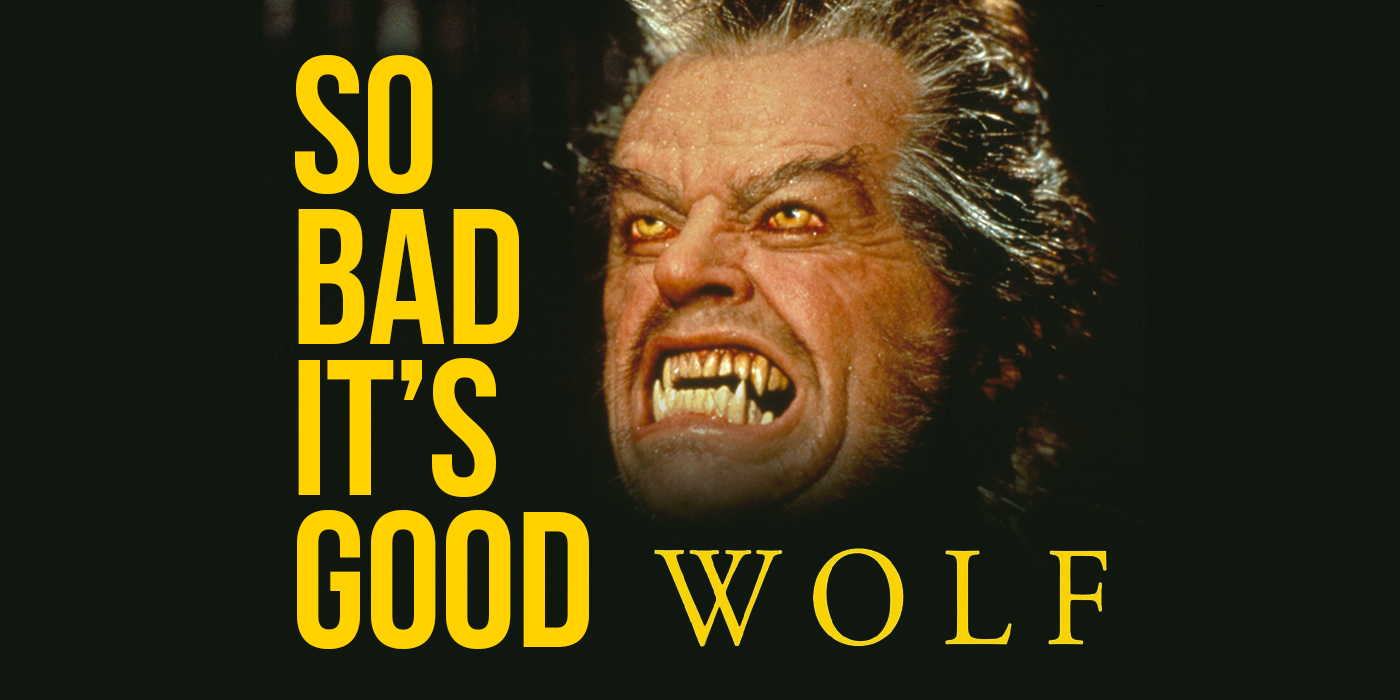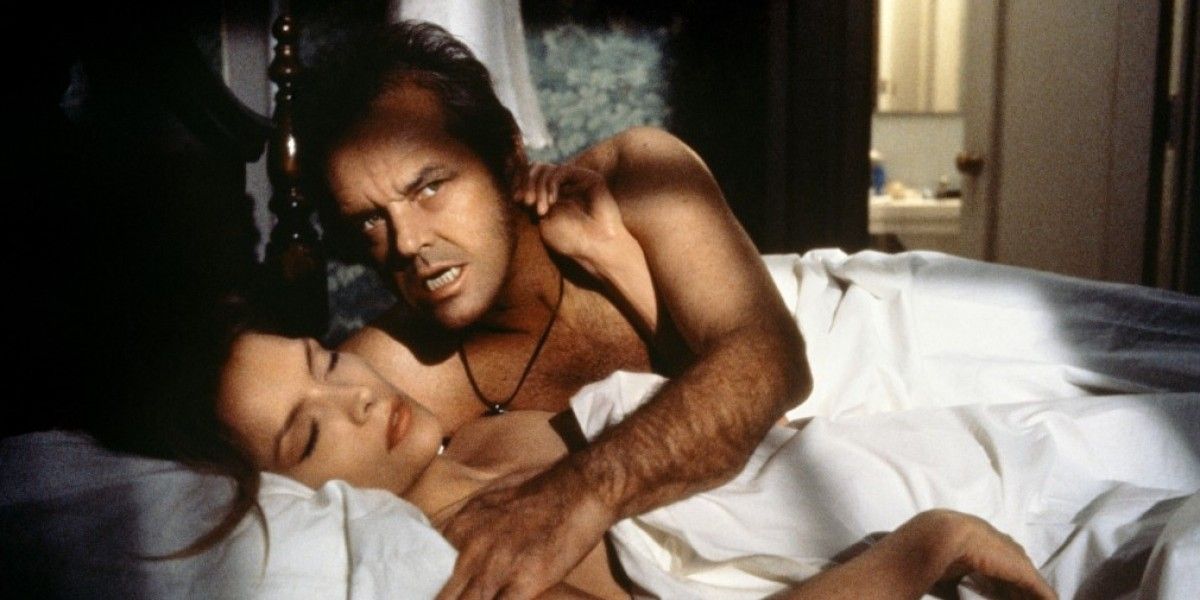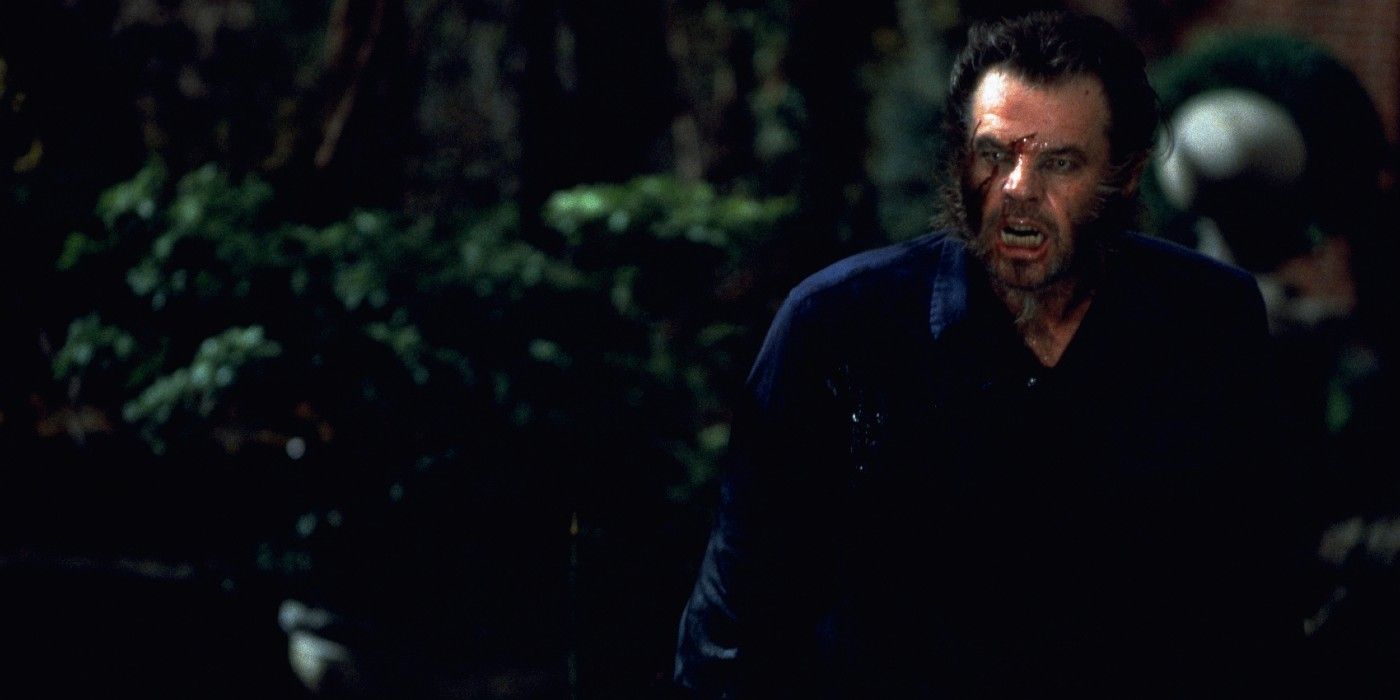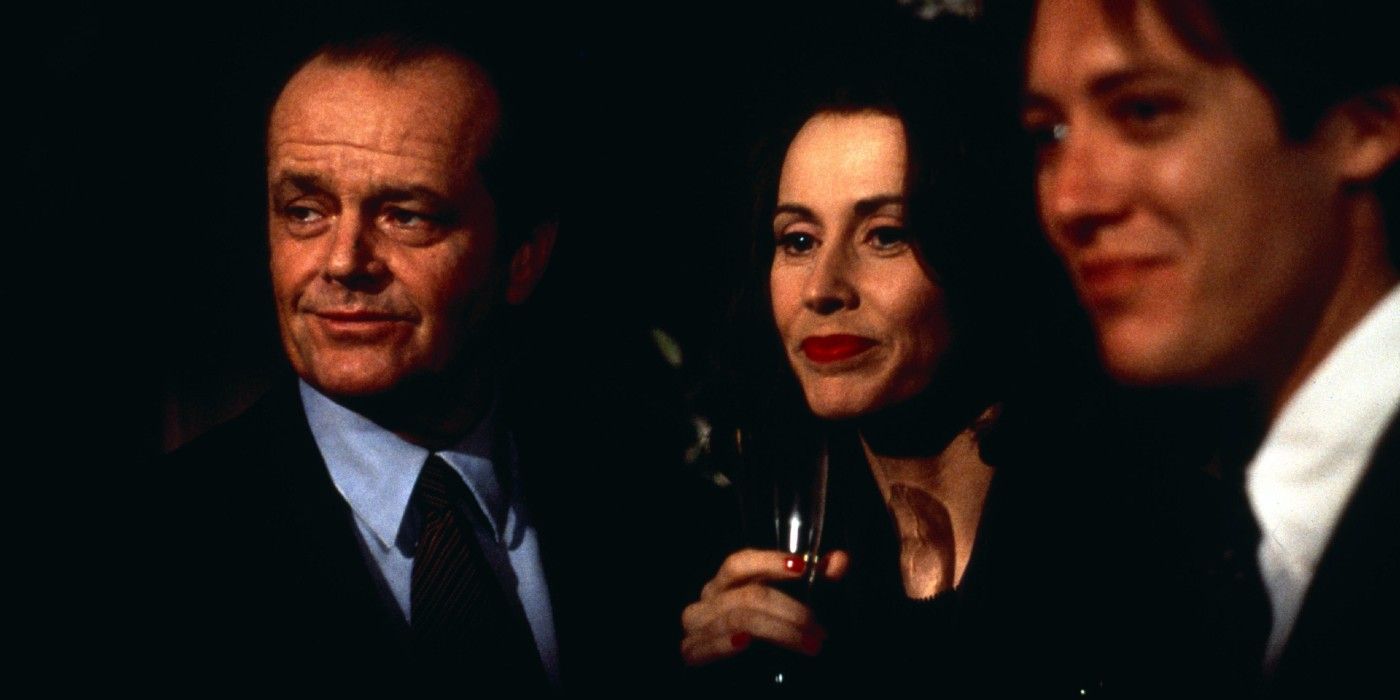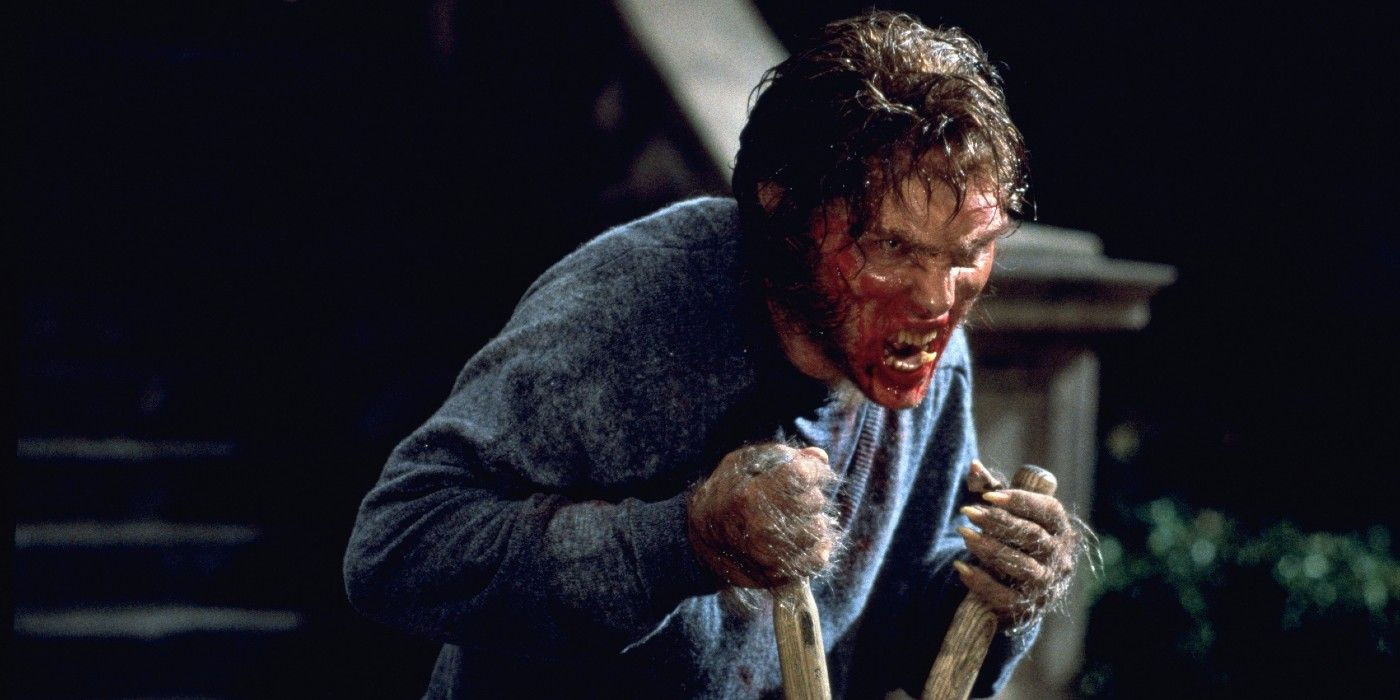There is simply no collection of words that can sufficiently prepare you for the motion picture experience that is Wolf. It was released in the summer of 1994, when America was still feeling invincible enough after the extreme wealth of the 1980s and a decisive victory in Desert Storm to release bullshit like The Shadow and The Flintstones in theaters and ask people to pay money to watch them. Wolf falls firmly into the same category of “movies that absolutely should not exist, and furthermore do not seem to have been made with anyone’s enjoyment in mind.” It is an exercise in extreme, unrestrained hubris, the cinematic equivalent of having a cheeseburger pizza delivered to a motel room with no functioning toilet. It’s a piece of art that most people only wish they were bold enough to create, a two-hour wheel of cheese that refuses to be entertaining but defies you to look away from each glorious frame featuring Jack Nicholson’s triumphantly sweaty werewolf face. But it’s a trick; you cannot take your eyes off of Wolf, the only movie in human history about a wolfman shrewdly negotiating for a promotion at a New York publishing house.
Wolf feels like a bad dream someone else had about werewolves. It feels like an improv troupe made a movie based on the worst possible audience suggestion. It’s not witty enough to truly be called a satire. Its love story is too bizarrely chaste and underwritten to be called a romance. And it’s too ploddingly dull and bloodless to be a horror movie. It’s a gothic yuppie soap opera, full of corporate vampires, trust fund ghouls, and one (1) genuine werewolf. Consequently, I can safely say that my entire life has been building up to two events – me watching Wolf, and me watching Wolf a second time before writing this piece.
The first thing to notice about Wolf is the incredible amount of talent behind it. Directed by Mike Nichols and co-written by Nichols’ longtime collaborator Elaine May, Wolf also boasted an A-list cast lead by Nicholson and Michelle Pfeiffer. When Wolf hit theaters in 1994, there were 19 Oscar nominations and 3 wins between just those four names. (Nicholson and May would go on to enjoy a few more noms later on, and I think Pfeiffer is due for another nod here soon.) And that’s before you see the legendary Christopher Plummer explode onscreen hosting the fanciest of fancy dinner parties at his haunted mansion in upstate New York. Wolf is so stacked with talent that Oscar nominee Kate Nelligan is utterly wasted as Nicholson’s frigid wife and Allison Janney pops up to deliver a single line and is never seen again. Fucking Ennio Morricone wrote the score. You didn’t have to go so hard, Wolf, but I appreciate that you did. My point is, you’d be forgiven for looking at all of the people involved with Wolf and coming to the conclusion that it’s a good movie. Also, the average age of the person who would look at that lineup and buy a ticket in 1994 is about 47, and that alone might be my very favorite aspect of the film’s legacy.
Picturing all of the people my parents’ age and older sitting in the audience as the opening credits of Wolf begin to roll is an exercise I do roughly three times a day to maintain my spiritual well-being. It’s like meditation, except I’m sitting around thinking about old people watching Wolf. If you can make time in your daily schedule to do the same, I cannot recommend it enough. Since I started thinking about a captive room of baby boomers paying money to sit through 122 minutes of Mike Nichols’ werewolf picture, my credit score has gone up 300 points and I’ve gotten slightly taller. Wolf is like playing a practical joke by accident, like that video of a cop shooting himself in the leg while giving a classroom of kids a demonstration on firearm safety.
On paper, I can maybe see why all these Hollywood heavyweights would be on-board for Wolf. The bones of an interesting satirical metaphor are there – Will (Nicholson) is a member of the high society. He’s extremely civilized, articulate, and well-read, having spent decades working as a successful publishing agent. His job is essentially to judge art and decide which of it is good enough to sell to other sophisticated people like himself. But Will is also restrained by social rules. He avoids confrontation, even when his mentor Raymond (Plummer) screws him over and gives his job to his slimy protegee Stewart (James Spader), who by the way is also sleeping with Will’s wife. Wolf argues that Will, like all of us, is trapped by the arbitrary rules of “civilized behavior,” requiring him to smile and demure politely while both his career and his marriage are taken from him. He’s an old dog who avoids confrontation to a fault, even giving Stewart his blessing as he prepares to step aside from his position at the publishing house. But then Will gets bit by a werewolf and all bets are off, babaaay! He starts standing up for himself, being proactive and ruthless to thwart Raymond’s wishes and keep his job, getting Stewart fired in the process. You see, wolfmen don’t worry about being polite; they simply assert their dominance and take what they want. He even pees on Stewart’s shoe in one truly unforgettable scene that I hope has been recreated during at least one Juilliard audition.
The point is, this is not a bad idea for a satirical werewolf movie commenting on the smiling violence of high society – everyone in Will’s circle is just as brutish as the literal werewolf, but they hide behind a smokescreen of sophistication. They’re not prepared for the in-your-face realness of a million-dollar publishing wolfman. Will’s out here pissing on people’s shoes and they all but cluck their tongues at him. It’s the exact same energy as Rodney Dangerfield infiltrating the snooty country club in Caddyshack, only in Wolf, Rodney’s character has been reimagined as a shapeshifting demon.
However, as I mentioned earlier, Wolf has an identity crisis, and it’s a fascinating one. Watching it, you get the feeling that the script is being pulled in three different directions (it has two credited writers, with May’s work left uncredited). It fails as a satire because it never bothers to actually be funny or insightful beyond its surface level metaphor, and instead delivers helping after helping of unintentional comedy in the form of Jack Nicholson’s X-Men muttonchops and his trademark werewolf run, which looks like Jack Nicholson sprinting to an airport bathroom while trying to move his arms as little as possible. I refuse to describe this action in any other way.
RELATED: 'Mars Attacks!' Is Good - Here's Why It Deserves More Respect
There’s a clumsy romantic plot between Nicholson and Pfeiffer that produces some decently acted scenes between the two but no real sparks (the fact that Jack is visibly several decades older than her strangles a lot of that potential chemistry to death). Their relationship begins with a scene in which they eat peanut butter sandwiches while Nicholson straight up tells her he got bitten by a wolf and now has wolf powers, and this movie was intended to be a serious drama for adults. And the thought of spotting a VHS of Wolf anywhere near the Horror section in Blockbuster makes me understand why they went out of business. The most horrific this movie gets is when Will discovers two severed fingers in his pocket, torn from the hand of a mugger he killed offscreen the night before. He saved the fingers for some reason, presumably to have as a snack, but he faces no consequences for the murder and it is never mentioned again. Indeed, being a werewolf seems to be nothing but awesome for Will. He gets enhanced senses that allow him to hear distant phones ringing and accuse his coworkers of being alcoholics, and a rejuvenated sex drive that grants him the ability to crush ass like he was in his early 40s. It never really causes him any problems until the last ten minutes of the movie, after two hours of virtually no conflict. The aspect of lycanthropy that Wolf is most concerned with is the restorative powers the curse of the werewolf has on Jack Nicholson’s thinning hair. And even though the practical make-up effects were handled by horror icon Rick Baker, the fully-transformed werewolves in the film look like characters from Fraggle Rock.
My mom forbade me from seeing Wolf while it was in theaters because she assumed it would be loaded with too much violence and sex for me to handle at that age. As it turns out, Wolf features zero sex and some minor gun violence at the end. My mom was right to keep me from buying a ticket, because I would’ve been bored out of my fucking skull. But after seeing it as an adult, I can appreciate how truly baffling it must’ve been to settle in for a matinee showing of the latest movie from the director of The Graduate and having Wolf unfold in front of your eyes. The movie begins with Jack Nicholson hitting a motionless stuffed wolf in the middle of the road at approximately 78 miles per hour, and it only becomes more incomprehensible from there. (Yes, Jack’s character gets the werewolf curse by literally running one over with his car.) It’s closer to a stream-of-consciousness manifesto than an actual story, a high-concept deconstruction of elitist culture that somehow necessitated a scene in which a hirsute Jack Nicholson muscles a flailing deer to his hungry maw before snapping its neck like Solid fucking Snake. And you absolutely must watch it.

